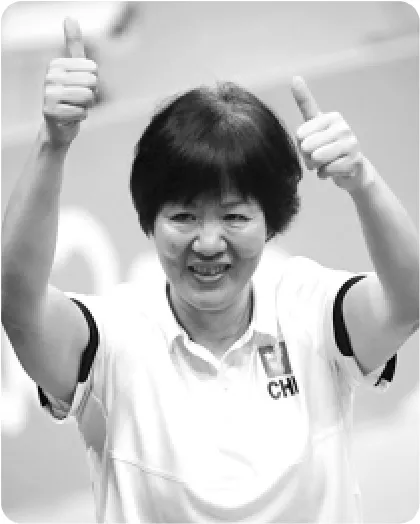Chinese women's volleyball:A team that transcends generations
江西萍鄉(xiāng)市第二中學(xué) 葉 敏
Rarely has a sports team in China received praise and admiration as effusively (熱情洋溢地) as the Chinese women's volleyball team. The spirit of the team goes beyond the mere sportsmanship.More importantly, it represents national pride, which has inspired Chinese across generations.
A bright spot in hard times
If there is one group of heroines that can transcend(超越) generations in China's sporting history,it's the Chinese female volleyball team. In 1981, the team beat Japan 3-2 and won the FIVB Women's World Cup for the first time in history. The victory greatly boosted Chinese people's patriotism and morale(士氣) in an age when the country's might was hardly recognized in the world. They went on to gain gold medals at the 1982 World Championship, the 1984 Olympic Games, the 1985 FIVB Women's World Cup and the 1986 World Championship.
However, the team still had to train under tough conditions due to a lack of financial support at the time. The floor of their training court was made of cement and was full of potholes (坑洼). The players were often hurt after rolling on the ground in training to recover the ball. Facing all the challenges, they did not complain, but chose to move on. Their incredible title-winning run inspired the whole nation, which admired their remarkable resilience, dedication and unyielding (頑強(qiáng)不屈的)spirit.
A timeless symbol
The Chinese women's volleyball team touched the heartstrings of the whole nation again during the 2004 Summer Olympics in Athens, Greece, where they beat Russia in a thrilling final. Russia won the game's first two sets, and seemed on the way to victory. However, China managed to stage an amazing comeback, fighting to tie the score. During the tiebreaker, China made no mistakes and won the title-deciding final set.

Millions of Chinese people watching the game on television witnessed the exciting moment when all Chinese players rushed onto the court, cheering and celebrating. Newer Chinese women's volleyball teams have echoed the success stories enjoyed by teams before them. But, what's different now is that China has become known as a sporting power. For observers, if the world titles won in the 1980s showed the world that China had what it took to become a sports power, achievements earned in the new era are a symbol of China's continued progress and unstoppable preeminence in sport.
Pass the torch in a new era
On December 10, 2019, Lang Ping celebrated her 59th birthday. Nicknamed the “Iron Hammer”during her playing days, she is considered as one of China's greatest sporting figures. Lang captained the Chinese women's volleyball team that won the gold medal at the 1984 Summer Olympics in Los Angeles, and then as a coach, led Team China to victory at the 2016 Rio Olympic Games.
No one seems more appropriate than her to pass the spirit of Chinese women's volleyball on to the younger generation and luckily enough, there is already a torch bearer: Zhu Ting. The 25-year-old player has already become a household name in China through her outstanding leading role in winning the finals at the Rio Olympics, the 2019 World Cup in Osaka as well as her three successful years at the Turkish club VakifBank in Istanbul. When Lang Ping coached Guangdong Evergrande in the Chinese Volleyball Super League eight years ago, she quickly spotted Zhu's talent. In 2013, Zhu was called up to the national team as soon as Lang took it over. “She is gifted, flexible,and is exactly the same type of player as I was when I was young,” Lang said.
Zhu certainly lived up to expectations. Despite all her sporting accolades (贊揚(yáng)), she has stayed grounded and humble, displaying a voracious(渴求的) hunger for improvement. “I'm committed to my goals and dreams. And passing on the spirit of the Chinese women's volleyball team really makes me a better player,” she said. Surely, that spirit will live on.

Critical thinking
What made the Chinese women's volleyball team so successful?

